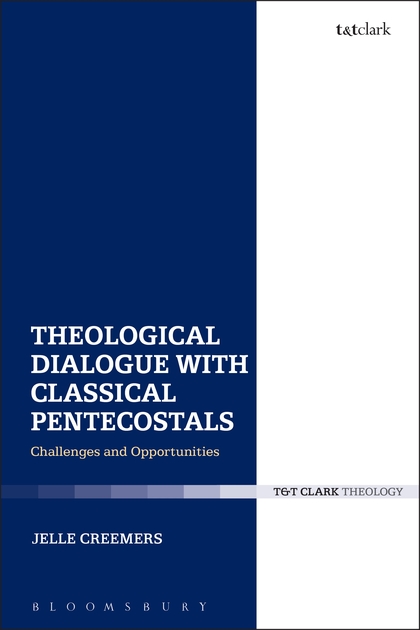| May 6, 2017 |
no comments
 Jelle Creemers, Theological Dialogue with Classical Pentecostals: Challenges and Opportunities, Ecclesiological Investigations 23 (New York and London: Bloomsbury/T & T Clark, 2015), x + 320 pages.
Jelle Creemers, Theological Dialogue with Classical Pentecostals: Challenges and Opportunities, Ecclesiological Investigations 23 (New York and London: Bloomsbury/T & T Clark, 2015), x + 320 pages.
The Roman Catholic-Pentecostal Dialogue has completed five rounds since it was launched in 1971. Each round has consisted of weeklong or so meetings for five or more years, followed in the last three rounds by multiple years of drafting and rewriting of the final reports. The first two rounds (1971-1976 and 1977-1982, with 1978 being a bye year due to the unexpected death of Pope John Paul I) engaged assorted topics of mutual interest, while the last three rounds have been more thematically focused: on the nature of the church (1985-1989), on evangelization and proselytism (1990-1997), and on becoming a Christian (1998-2006).
Dialogue that works toward understanding – not any watered down synthesis.
Creemers teaches at the Evangelische Theologische Faculteit in Leuven, Belgium, where he also completed his PhD degree that is the basis for this book. Whereas a number of other volumes have been published on one or more rounds of the Dialogue, this is the first one that covers the five completed rounds of discussion, and it is also the only to focus on the question of theological method. At one level, followers of the
Pneuma Review might consider this a rather dispensable exercise. Pentecostal ministers especially are doers rather than theoreticians and considerations of method seem quite speculative and abstract. Even if readers might be interested in the topics taken up in the Dialogues, Creemers’ reflections might seem beside the point (of evangelism, for example!). Yet I encourage potential readers, especially Pentecostal clergy, to withhold judgment for three reasons. First, there have been many who have argued that Pentecostals are ecumenical even if they might deny or not even realize this, and if that is the case, engaging this volume will provide one fascinating point of entry into the
what (is ecumenism) and
why (Pentecostals are such) of this important set of issues related to unity that Jesus prayed for. Second, the writing opens up to a narrative of the Dialogues, and in that sense there is an unfolding of a plot full of twists and turns involving primary agents (who were present in many if not most of the rounds) and other secondary characters (those participants in two rounds or only one) that might be unanticipated for theological books. Last but not least, to think about the methodological underpinnings of these exercises provides another window into the nature of Pentecostal spirituality and realities that the movement’s practitioners and ministers will find informative, especially vis-à-vis their own efforts to comprehend themselves theologically.
There have been many who have argued that Pentecostals are ecumenical, even if they might deny or not even realize it.
So what does Creemers find? Or, first, how does he go about looking for Pentecostal theological method when such is rarely or never made explicit? There are four main chapters in the body of the book through which the quest is undertaken. First, Creemers profiles how members of the Pentecostal Dialogue teams have attempted to understand themselves as a conversionist, revivalist, and restorationist movement, and how such starting points already chart certain methodological trajectories. Second, efforts – contested, as the book portrays – to adequately represent a quite diverse worldwide Pentecostal movement in the dialogue teams are indicative of how an egalitarian set of ecclesiological sensibilities generates a fragmented movement and this also has methodological implications, not least for how the Dialogues have unfolded. Third, then, Creemers analyzes one weeklong session within each of the five rounds – the second year, because that is when the main topics are presented for that round of dialogues – and unveils how reading and exposition of papers have been followed by “hard questions” raised by both sides to the other for discussion (first intra-murally and then inter-murally) in order to clarify perspectives, identify differences, and anticipate possible convergences or ways forward. Finally, the aims, sources, and approaches of each of rounds of Dialogue are assessed, in chronological order, and then also vis-à-vis their Final Reports.
Tags: classical, creemers, dialogue, jelle, pentecostals, theological
Category: In Depth, Spring 2017
 Jelle Creemers, Theological Dialogue with Classical Pentecostals: Challenges and Opportunities, Ecclesiological Investigations 23 (New York and London: Bloomsbury/T & T Clark, 2015), x + 320 pages.
Jelle Creemers, Theological Dialogue with Classical Pentecostals: Challenges and Opportunities, Ecclesiological Investigations 23 (New York and London: Bloomsbury/T & T Clark, 2015), x + 320 pages.

